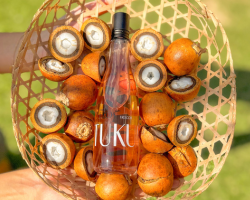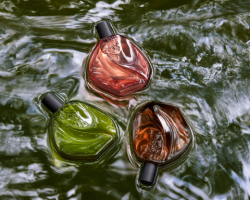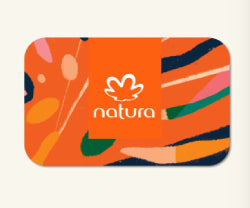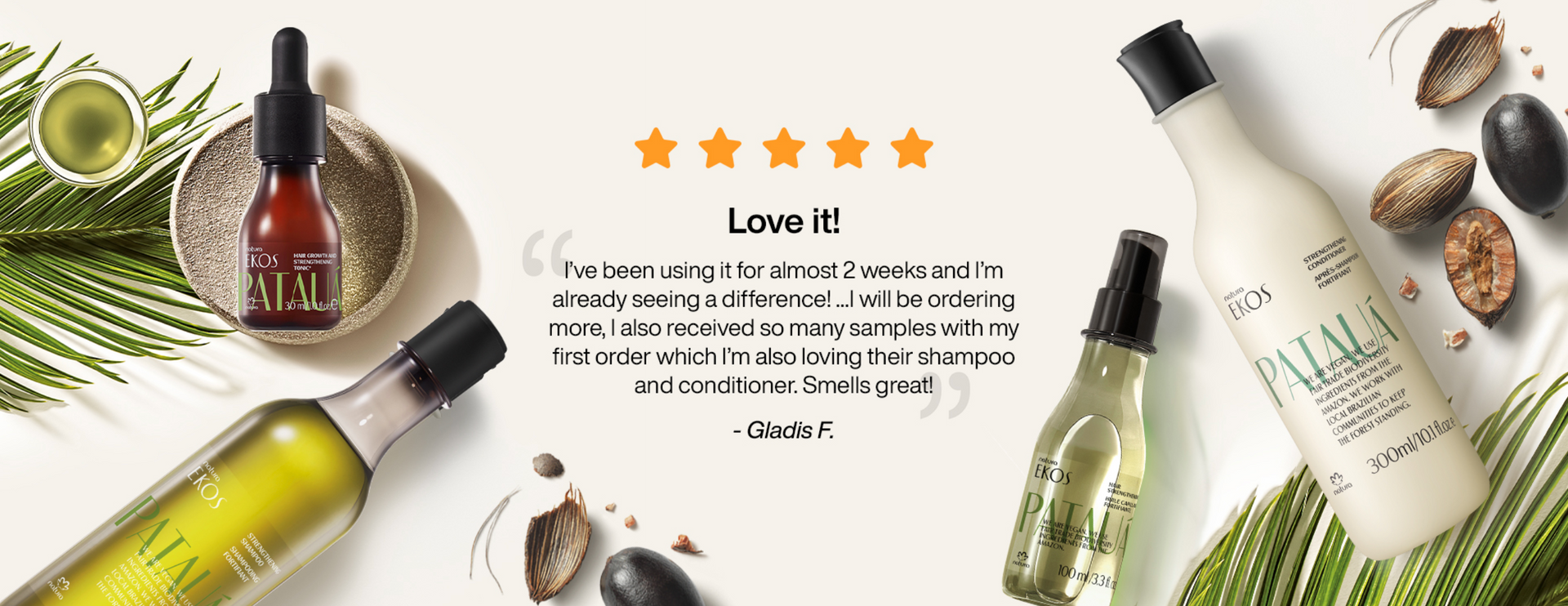How to Naturally Stimulate Hair Growth
Learn more about your strands, how they grow, and how to stimulate hair growth naturally.
- By Natura Team
Hair is a key aspect of our appearance. Whether it is blue or brown, straight or curly, short or long, what really matters when it comes to the beauty of it is how healthy and well cared for it is. In this article, you will learn more about our strands and how they grow, and find tips on how to stimulate hair growth naturally and boost your hair length, strength, and health.
Ready? So keep on reading!
How does hair work, exactly?
To understand how the steps you're about to follow really work, you have to learn some basic facts about our hair and how it actually grows.
First of all, did you know that hair growth happens in our entire body, except on the soles of the feet, lips, palms of the hands, navel, and eyelids? In another moment of human history, it probably served the purpose of keeping us warmer and protecting some sensitive areas.
Second, what exactly is hair? Well, it is basically made of a protein called keratin, which is made of multi-layers of flat cells, forming a rope-like filament (a.k.a, each hair shaft). Those filaments grow from follicles on our dermis, and they can be thick and long terminal hair or fine and short vellus hair. When we talk about hair growth and hair care, we are discussing terminal hair.
Anchoring the hair into the scalp, hair follicles are made up of the papilla and bulb – structures located beneath the scalp. Containing the active cells, which grow the hair around the papilla, the bulb can be found at the bottom of each strand. In its turn, papilla provides the blood supply that the hair follicle needs to promote hair growth.
Hair growth cycleWe have three stages in the hair growth cycle, which are called anagen, catagen, and telogen. Each and every strand on our bodies are going through one of theses stages at any given time.
The first phase of the cycle, the anagen phase, is the period where we can actually see hair growth. The cells in the hair bulb divide rapidly, producing new hair fibers that are going to continue to grow as the follicle itself is anchored deep into the dermal layer, supplying the strand with nourishment. About 90% of our hair is currently at this phase, which can last from 2 to 7 years, depending on genetics. Once the hair reaches its maximum length (which can be anywhere between 18 to 30 inches), the hair follicle becomes dormant.
The second phase is much shorter than the first, and it is called the catagen phase. Lasting only 2-3 weeks on average, it is a transitional phase in which hair stops growing and detaches itself from the blood supply, creating the so-called club hair.
Then comes the final phase, called the telogen phase. It is a resting period, where club hair rests in the root while new hair begins to grow beneath it. After around 3 months, the resting club hair will fall out to allow the new hair to come through the hair follicle. It is a natural process, that more often than not goes completely unnoticed.
Stimulate natural hair growthNow that you know about the phases of hair growth, you may have noticed that the anagen phase is the one where actual growth happens, which means that this is the most important phase for those who want to stimulate hair growth.
Even though there is no way to go around genetics and age factors, there are some things one can incorporate into their routines to keep the hair strand in the anagen phase as long as possible. Check them out:
Massage your scalpBy incorporating regular scalp massages into your routine, you can help restore hair growth, stimulate the bulbs that nourish strands, and promote overall health and well-being for the roots of your hair.
While scalp massages can improve hair thickness and growth, it is also great for stress and tension relief. You can use just your hands or choose a hair tonic to complement this routine.
Get frequent trimsWhile haircuts may not necessarily streamline hair growth, they do get rid of split ends that break your hair. A split end that breaks can lead to your hair losing length — not to mention shine, volume, and smoothness.
Avoid chemical treatmentsDying your dark hair pink may be on your wish-list, but it definitely does not help with natural hair growth. If you aim to have the longest-possible hair, resist these huge changes. When the cuticle of the hair is damaged from bleach, you can have more breakage or split ends.
Brush your hairOf course, you do brush your hair frequently, but do you know why this is so important? This is the most effective way to distribute your hair's natural oils and to keep the natural moisture. In addition, it increases circulation, which helps make your scalp healthier.
But be mindful: avoid brushing your hair while wet and without pulling, since this is a very fragile state. Also, opt for tools with large and spaced bristles.
Avoid heatHeat styling tools damage your hair, leading to breakage and frizz. If you can’t leave this habit behind, decrease the temperature, and apply a heat protectant.
Less shampooYour hair is able to hydrate and repair itself with its natural oils. So, don't over-wash your hair. For many people, shampooing two or three times a week is enough. But if you prefer washing more frequently, try skipping shampooing the whole length of your hair - just apply shampoo to the roots and you’ll be fine.
Cool rinseHigh temperatures are as bad to your hair as they are to your skin. Rinse your hair with cool water to help seal the cuticle and strengthen your hair before styling it.
Be careful with wet hairMake sure to use a brush that will go easy on your strands when your hair is wet, as it is susceptible to breakage. Start gently brushing from the ends and gradually work your way up.
Silk pillowcasesSilk helps avoid tangles and breakage when you sleep on it. The less breakage your hair experiences, the longer your hair will be.
What’s the impact of your lifestyle on hair growth?
Hair growth is not only about hair care and hair products. The way you take care of your body is also important when it comes to hair growth stimulation. To promote hair growth, you need to increase your protein intake, especially by consuming food like fish, beans, nuts, and whole grains.
Hair follicles are mostly made of protein, and the lack of it promotes hair loss. Proteins 'feed' the hair from the inside. Foods high in protein, vitamins A, C, and E, minerals like zinc and iron, and omega-3 fatty acids can contribute to healthier hair. But just like some food can be super good for your hair, other ones can be very bad.
Diet villains
SugarSugar hinders the absorption of proteins. Since it is the most important substance to hair growth, there is no need to explain why to avoid sugar in your diet.
Starchy white foodsStep away from white bread, cakes, pastries, white pasta, and other refined, over-processed starches. They are converted into sugar, which causes your hair to thin.
AlcoholZinc is a necessary mineral for healthy hair and growth. Since alcohol slows the levels of zinc in your body and dehydrates you, your hair becomes more likely to be brittle.
SwordfishSwordfish is high in mercury than other seafood options. High levels of mercury may be linked to hair loss.
Hair heroes
EggsA great source of protein and biotin, eggs are also a great source of zinc, selenium, and other hair-healthy nutrients. It is important to know that biotin is essential for the production of a hair protein called keratin. So, a balanced diet may prevent you from taking unnecessary supplements.
BerriesSuch fruits are loaded with beneficial compounds and vitamins that may promote hair growth, including vitamin C, which has strong antioxidant properties.
BeansHighly versatile and inexpensive, which makes them an easy addition to the diet, beans are a great plant-based source of protein, which is essential to hair growth. A good source of zinc, which aids the hair growth and repair cycle, they also provide many other hair-healthy nutrients, including iron, biotin, and folate.
Shrimps, oysters and fatty fishesProtein, B vitamins, zinc, iron, vitamin D, omega-3 fatty acids… You may find all these nutrients that significantly reduce hair loss and increase hair growth on these seafood options.
Nuts and seedsMassive amount of nutrients with relatively few calories? Try to consume nuts and seeds. In order to get the widest variety of nutrients, it is best to consume a mixture of them.
SpinachFolate, iron, and vitamins A and C, iron… They are all essential to hair growth and may be found in spinach, a green vegetable that’s loaded with beneficial nutrients.
Technology as an ally
Natura has the right products for your routine, like shampoos, conditioners, hair mask, oils, and hair tonic to address every hair type or condition. Our Patauá Hair Tonic in particular prevents hair loss due to breakage and strengthens strands from root to tip.
Check out our complete hair care lines and products, we certainly have the right choice for your beauty routine!






















